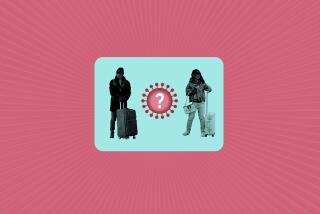When Sickness Strikes on Vacation
- Share via
When a medical problem occurs on a trip or vacation and you think you need attention, first do what you would at home: Call your physician. You can call from anywhere--even overseas.
On the basis of your symptoms, your physician can tell you whether you can treat yourself, how to treat yourself, if you should seek medical attention, what kind of medical attention you need, and whether you should come home for treatment.
If the physician you are calling is a specialist in asthma, for example, ask him for the name of a colleague in the area you are visiting. All specialties have directories listing every member of that specialty, including overseas members.
Others Can Help
When necessary, also consider calling your pharmacist, dentist, optometrist and other health professionals.
At home, keep the telephone numbers of your physicians and health professionals in a convenient, safe place. Make several copies for travel. Keep a copy in your wallet and one in your luggage. Also, give a copy to friends and relatives you would call in an emergency.
If you keep a first-aid manual at home, why not routinely pack it for trips? Illnesses and accidents that occur on trips and vacations often seem worse than they are, say hotel physicians. As a result, travelers often seek medical assistance for trivial conditions, ones they would easily handle themselves at home.
The most common problems seen by hotel physicians are upper respiratory infections (colds), intestinal upsets, and aches and pains resulting from minor accidents. With a medical manual you can handle most problems yourself and, if necessary, can better describe the problem to your physician by telephone.
For Serious Problems
If you become ill at a hotel or motel and think your problem is serious, do not wait for the hotel physician to come to you. Take yourself to the largest medical center in the area. This will save time and result in better care. Hotel physicians are usually not in the building. They have to be summoned and they are limited in how much assistance they can provide by the contents of their medical bags.
From hotels, the fastest way to an emergency room is in a taxi. Drivers generally know the way. When no taxi is available, ask the manager for transportation. They can usually supply a car in an emergency.
Think twice when treatments suggested to you seem unorthodox compared to treatments you are accustomed to at home. This is especially important overseas. Sometimes, potentially harmful methods and medications are employed to treat trivial complaints. If in doubt, call your physician.
Extensive Treatment
If an illness or injury requires extensive treatment or surgery, suggest that you would prefer to be treated by your own physician back home. This is not always feasible but many conditions can easily withstand a trip home.
Ask the physician treating you to talk to your physician at home. Arrange the telephone call yourself.
At home, your physicians keep records of every visit. When you see a physician away from home, ask the physician to give you a written copy of your diagnosis and treatment. This will help your physician if your illness continues.
And always ask for receipts for all medical expenses. This will help you recover expenses from your insurance company.
More to Read
Sign up for The Wild
We’ll help you find the best places to hike, bike and run, as well as the perfect silent spots for meditation and yoga.
You may occasionally receive promotional content from the Los Angeles Times.






